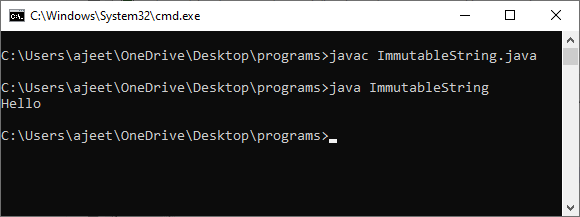What Is Immutable Strings and How It Works
In the world of shows, comprehending the principle of unalterable strings is vital for developing durable and secure applications. Immutable strings refer to strings that can not be modified after they are developed, making sure data honesty and predictability within the code. This basic concept plays an essential function in various shows languages and provides an unique method to managing data. By exploring the intricacies of how immutable strings function, one can reveal a globe of benefits and possibilities that can boost the top quality and effectiveness of software program growth.
The Basics of Immutable Strings
Unalterable strings, as an essential principle in shows, are personality series that can not be transformed once they are created. This implies that once a string is assigned a worth, that value can not be changed. In languages like Python and Java, strings are immutable things, bring about various implications in regards to memory management and data stability.
Among the key advantages of unalterable strings is that they give a complacency in information adjustment. Since the material of an unalterable string can not be changed, it guarantees that the original information stays intact, lowering the danger of unintentional changes during program implementation (Why are strings immutable in Java?). This residential property also streamlines debugging processes, as developers can rely on that once a string is specified, its value will not be unintentionally altered
Moreover, unalterable strings assist in reliable memory use. When a brand-new string is created based upon an existing one, as opposed to customizing the initial string, the new value is kept independently. This approach enhances performance by reducing memory fragmentation and simplifying memory allotment procedures. In general, recognizing the essentials of unalterable strings is critical for understanding shows ideas and optimizing code effectiveness.
Benefits of Unalterable Strings
Structure upon the security and effectiveness benefits of unalterable strings, their advantages expand to enhancing code integrity and simplifying concurrent programming tasks. By being immutable, strings can not be changed after production, which eliminates the danger of unintentional modifications in the data they keep. This fundamental immutability makes sure that once a string is produced, its value stays consistent throughout the program's execution, lowering the opportunities of pests caused by unexpected changes.
Furthermore, immutable strings add to code integrity by making it easier to reason regarding the state of a program. Since strings can not be transformed, designers can rely on that a string will constantly hold the exact same worth, simplifying debugging and maintenance efforts. This predictability results in a lot more secure and dependable codebases.

Execution in Programming Languages
Within different shows languages, the incorporation of immutable strings is a fundamental facet that impacts exactly how data is taken care of and adjusted within More Info code frameworks. The application of unalterable strings varies throughout different programming languages, with each language providing its own systems to sustain this principle.

On the other hand, languages like C and C++ do not have built-in assistance for unalterable strings. Developers in these languages should by hand implement immutability by imposing policies within their code to avoid direct adjustments to string objects.
Best Practices for Dealing With Unalterable Strings
When managing unalterable strings in programming languages like Java and Python, adhering to ideal techniques makes sure secure and effective data manipulation. One of the vital best practices is to make use of StringBuilder or StringBuffer rather than directly adjusting strings, especially when dealing with substantial concatenation procedures. These courses give mutable options for string control, aiding to prevent unnecessary memory appropriations and boosting performance.
One more ideal technique is to utilize string interpolation or formatting functions offered by the language as opposed to manual concatenation. This not only boosts readability however additionally help in stopping common mistakes such as unintended string modifications. In addition, when working with sensitive data such as passwords or API secrets, it is critical to stay clear of saving them as simple text in unalterable strings. Making use of safe storage space systems like char ranges or specialized collections for taking care of sensitive details assists mitigate security risks connected with unalterable strings.
Real-world Applications and Examples
Discovering functional executions of immutable strings in various sectors reveals their considerable influence on information honesty and system dependability. In the health care field, unalterable strings play a vital function in ensuring the protection and confidentiality of client data. By protecting against unauthorized alterations to delicate information such as clinical documents and prescriptions, immutable strings help keep compliance with strict privacy guidelines like HIPAA.
Banks also benefit from the immutable nature of strings to boost the safety of client data and purchase records. Unalterable strings assist stop fraudulence and unapproved changes to monetary information, giving a durable defense versus cyber threats and ensuring the count on and confidence of clients.

Final Thought
Finally, immutable strings are dealt with and unchangeable sequences of characters that provide advantages such as thread security and boosted performance in programming. They are applied in numerous shows languages to make sure information honesty and protection. Best methods for collaborating with immutable strings include avoiding direct adjustments and utilizing methods that return brand-new string objects. Real-world applications of immutable strings consist of data file encryption, caching, and string manipulation tasks.
Unalterable strings refer to strings that can not be modified after they are produced, ensuring data honesty and predictability within the code. When a new string is produced based on an existing one, rather than modifying the initial string, the new worth is saved individually.In languages like Java and Python, strings are immutable by default, meaning that as soon as a string item is created, its value can not be changed - Why are strings immutable in Java?. Ideal techniques for working with unalterable strings include preventing direct alterations and making use of techniques that return new string things. Real-world applications of immutable strings include data encryption, caching, and string control jobs